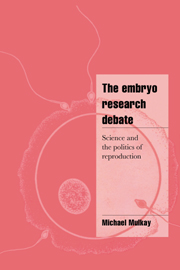Book contents
- Frontmatter
- Contents
- Preface and acknowledgements
- List of abbreviations
- Introduction
- 1 The background to the debate
- 2 The sequence of parliamentary debate
- 3 Political parties and ministerial tactics
- 4 The impact of the pro-research lobby
- 5 Embryos in the news
- 6 Women and men
- 7 Science and religion
- 8 The myth of Frankenstein
- 9 Embryo research and the slippery slope
- Epilogue: intruders in the fallopian tube or a dream of perfect human reproduction
- Notes
- Index
1 - The background to the debate
Published online by Cambridge University Press: 24 August 2009
- Frontmatter
- Contents
- Preface and acknowledgements
- List of abbreviations
- Introduction
- 1 The background to the debate
- 2 The sequence of parliamentary debate
- 3 Political parties and ministerial tactics
- 4 The impact of the pro-research lobby
- 5 Embryos in the news
- 6 Women and men
- 7 Science and religion
- 8 The myth of Frankenstein
- 9 Embryo research and the slippery slope
- Epilogue: intruders in the fallopian tube or a dream of perfect human reproduction
- Notes
- Index
Summary
Several of the major factors that determined the context in which the debate over embryo research took place can be traced back to the 1960s. This distinctive period in British public life also provides a useful point of contrast which helps to reveal more clearly why research involving human embryos became the focus of such vigorous controversy in the very different circumstances of the 1980s. In the first part of this chapter, I shall show how a combination of legislative reform and demographic change during the 1960s helped to create a potential demand for the reproductive techniques that grew out of such research in the 1970s. I shall then describe how the legislative reforms and the moral climate of the 1960s gave rise to a lasting political reaction which established the basis for organized opposition to embryo research in the 1980s.
The reform movement of the 1960s
In the second half of the 1960s, there was a wave of permissive legislation in Britain dealing with various matters of conscience. Because these matters lay outside the scope of the formal policies of the political parties, the new legislation was introduced by individual Members of Parliament in the form of Private Member's Bills. Between 1965 and 1969, five major Bills were passed which were intended to make the law less morally oppressive in relation to capital punishment, censorship of the theatre, homosexuality, divorce and abortion.
- Type
- Chapter
- Information
- The Embryo Research DebateScience and the Politics of Reproduction, pp. 6 - 19Publisher: Cambridge University PressPrint publication year: 1997



